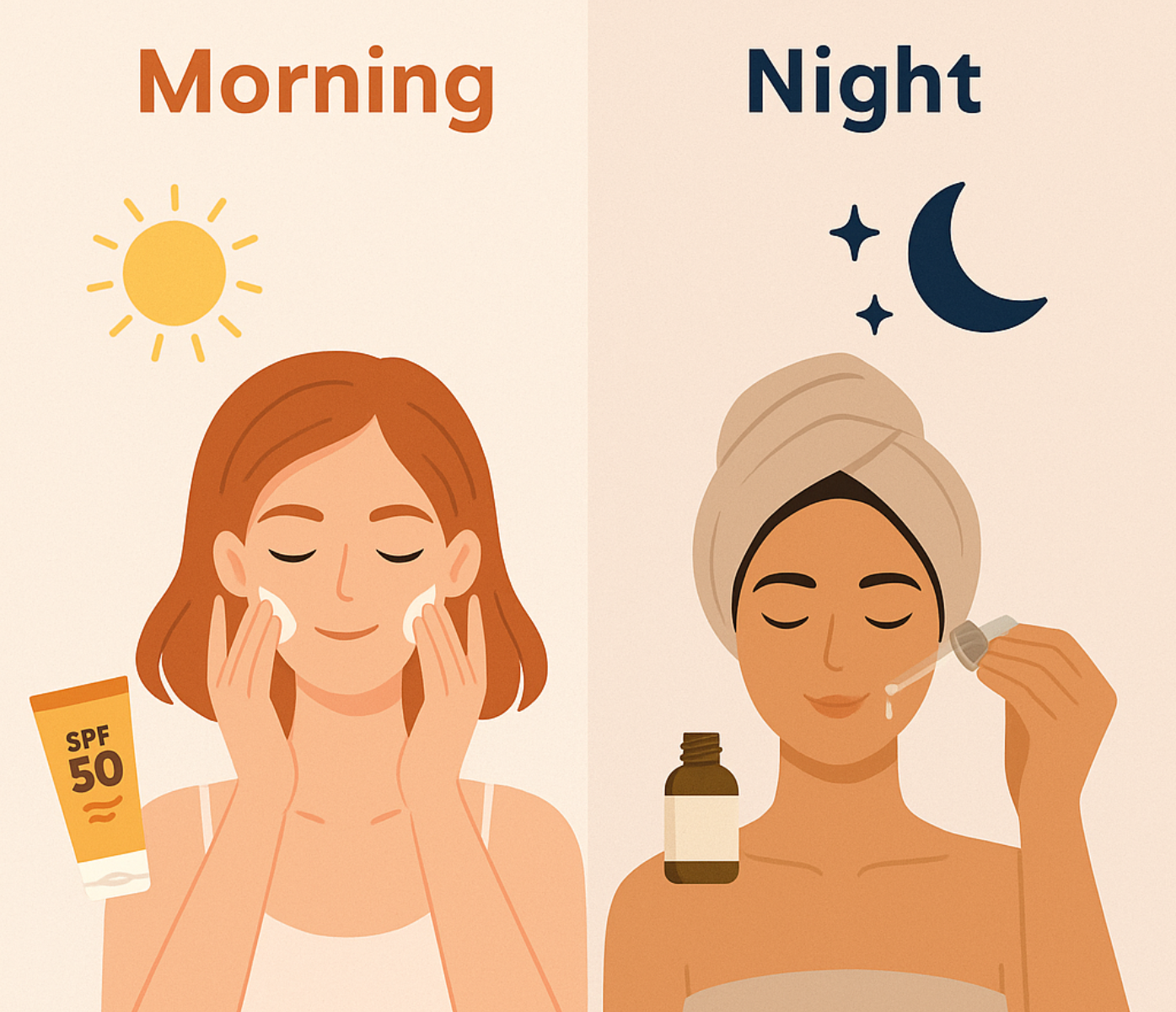Your skin is your largest organ, and taking good care of it requires understanding its needs at different times of the day. A common question many skincare enthusiasts ask is: Do I really need a separate morning and night routine? The answer is a resounding yes. Morning and evening skincare routines play very different roles in protecting and rejuvenating your skin. Let’s dive into why they’re different, how they work, and what products you should include in each.
The Purpose of a Morning Skincare Routine
Your morning skincare routine’s primary goal is protection. Throughout the day, your skin faces multiple external aggressors: UV rays, pollution, dust, bacteria, and even blue light from screens. The morning routine creates a barrier against these stressors while keeping your skin hydrated and fresh.
Key Steps for Morning Skincare:
- Cleanser – A gentle cleanse in the morning removes overnight oil and impurities.
- Toner – Balances your skin’s pH and preps it for better absorption of serums and moisturizers.
- Antioxidant Serum – Vitamin C serums are especially powerful in the morning. They neutralize free radicals and reduce oxidative stress, preventing premature aging.
- Moisturizer – Hydrates and strengthens the skin barrier.
- Sunscreen – The most crucial morning step. SPF protects against UVA/UVB rays, which cause sunburn, pigmentation, and skin cancer. Dermatologists recommend at least SPF 30; if you’re in India’s intense sun, SPF 50+ is ideal.
Why is sunscreen a must?
Morning sun exposure can cause lasting damage. Even short walks outside expose your skin to harmful rays, which break down collagen and elastin, leading to wrinkles and sagging. That’s why sunscreen is your morning routine’s best friend.
The Purpose of a Night Skincare Routine
While your morning routine protects, your night routine’s main goal is repair and regeneration. At night, your skin isn’t fighting external elements but is focused on renewing itself. Skin cell turnover increases while you sleep, making nighttime the perfect opportunity to use reparative treatments.
Key Steps for Night Skincare:
- Makeup Remover/Cleansing Balm – Removes makeup, sunscreen, and dirt from the day.
- Gentle Cleanser – Double cleansing ensures pores are clean and ready for treatment.
- Exfoliation (2-3 times a week) – Chemical exfoliants like AHAs/BHAs remove dead skin cells, unclog pores, and promote radiance.
- Toner – Restores hydration and balances the skin.
- Serums/Treatments – Ingredients like retinol, peptides, or hyaluronic acid work best overnight when skin is at rest.
- Moisturizer/Night Cream – A richer moisturizer helps repair the skin barrier and lock in hydration.
- Eye Cream – Addresses dark circles or puffiness.
- Face Oil (optional) – Seals in moisture for dry or mature skin.
Why Morning and Night Products Should Be Different
- Ingredients that are better in the morning : Antioxidants (like Vitamin C) fight daily environmental damage. Lightweight hydrating serums and SPF are also suited for daytime.
- Ingredients that are better at night : Retinol, which increases cell turnover, can make your skin sensitive to sunlight; it’s best used in the evening. Exfoliating acids and peptides also work better overnight to aid repair.
Using the same products morning and night might seem convenient, but it doesn’t give your skin what it needs at each time of day. Tailoring your routine helps you maximize your products’ benefits and keeps your skin healthy.
Common Skincare Mistakes
- Skipping Sunscreen in the Morning – Even on cloudy days or when staying indoors, UV rays can penetrate windows and damage skin.
- Using Retinol in the Morning – Retinoids degrade with sunlight exposure and can make your skin more sensitive to UV damage.
- Over-Exfoliating – Daily exfoliation can damage the skin barrier. Limit chemical exfoliants to 2-3 times per week.
How to Customize Your Routines for Your Skin Type
- Oily/Acne-Prone Skin : Use a foaming or gel cleanser. Incorporate lightweight, non-comedogenic moisturizers. Salicylic acid at night helps keep pores clear.
- Dry Skin : Opt for creamy cleansers and richer moisturizers both morning and night. Hyaluronic acid serums help attract and retain moisture.
- Combination Skin : Balance with lightweight hydration in the morning and targeted treatments (like niacinamide) at night.
- Sensitive Skin : Stick to gentle, fragrance-free products. Avoid harsh exfoliants and retinoids unless approved by your dermatologist.
The Role of Lifestyle in Morning and Night Skincare
Your skincare routine is only part of the equation. Sleep, diet, stress, and hydration levels also impact your skin’s appearance. Ensure you’re drinking enough water, eating a balanced diet, managing stress, and getting 7-9 hours of quality sleep each night to support your skincare efforts.
Final Thoughts
The difference between morning and night skincare isn’t a marketing gimmick; it’s rooted in your skin’s natural rhythms and needs. By understanding these differences, you can create a routine that defends against daily damage during the day and repairs overnight — leading to healthier, glowing skin in the long run.
Remember, consistency is key. It’s better to have a simple routine you follow every day than an elaborate one you abandon after a week. Listen to your skin, adjust based on how it reacts, and consult a dermatologist if you have persistent concerns.


